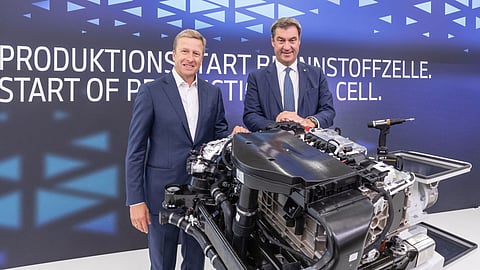BMW Commences In-house Production of Fuel Cells for BMW iX5 Hydrogen
On 31 August, Chairman, Board of Management of BMW AG, Oliver Zipse and Frank Weber, Member, Board of Management, BMW AG, inaugurated the fuel cell system production at the company’s competence centre for hydrogen in Munich.
The reason for this occasion is the small series of BMW iX5 Hydrogen cars that will be entering service around the world from the end of this year for test and demonstration purposes.
The combination of fuel cell and high-performance battery is set to enrich the company’s portfolio by adding a unique form of drive system for the premium segment.
The BMW Group is playing a visionary and pioneering role in this technology with the aim of achieving a more diversified transition to zero-emission mobility.
On the occasion, Zipse said: “As a versatile energy source, hydrogen has a key role to play on the road to climate neutrality. And it will also gain substantially in importance as far as personal mobility is concerned.
"We think hydrogen-powered vehicles are ideally placed technologically to fit alongside battery-electric vehicles and complete the electric mobility picture.
“By commencing small-scale production of fuel cells today, we are demonstrating the technical maturity of this type of drive system and underscoring its potential for the future.”
“Our many years of research and development work have enabled us to get the very most out of hydrogen technology,” added Weber.
“We have managed to more than double the fuel cell’s continuous output in the second-generation fuel cell in the #BMW iX5 Hydrogen, while weight and size have both decreased drastically,” Weber said.
BMW Doubles Electric Vehicle Sales in H1 2022
Thanks to these advances, the BMW Group leads the way in the development of #hydrogen technology and considers it to hold great promise for its next generation of vehicles.
Technological expertise and high standards of efficiency in the drive system
The BMW Group will now be manufacturing highly efficient fuel cell systems at its in-house competence centre for hydrogen. This technology is one of the core elements in the BMW iX5 Hydrogen and generates a high continuous output of 125 kW/170 hp.
It teams up with an electric motor featuring fifth-generation BMW eDrive technology and a high-performance battery purpose developed for this vehicle to enable its powertrain to deliver 275 kW/374 hp.
The development team incorporated the powerful drive system – comprising two hydrogen tanks, the fuel cell and the electric motor – into the existing #BMW X5 platform for the small production run.
The BMW iX5 Hydrogen already successfully demonstrated its excellent everyday usability, even at very low temperatures, during the final round of winter testing in Sweden at the start of this year.
Production of fuel cell systems in Munich
A chemical reaction takes place in the fuel cell between hydrogen from the tanks and oxygen from the air. Maintaining a steady supply of both elements to the fuel cell’s membrane is of crucial importance for the drive system’s efficiency.
In addition to the technological equivalents of features found on combustion engines, such as charge air coolers, air filters, control units and sensors, the BMW Group also developed special hydrogen components for its new fuel cell system.
These include the high-speed compressor with turbine and high-voltage coolant pump, for instance.
BMW Group sources the individual fuel cells required for manufacturing the BMW iX5 Hydrogen from the Toyota Motor Corporation. The two companies have enjoyed a partnership characterised by trust for many years and have been collaborating on fuel cell drive systems since 2013.
Fuel cell systems are manufactured in two main steps. The individual fuel cells are first assembled into a fuel cell stack. The next step involves fitting all the other components to produce a complete fuel cell system.
Read More: Volvo Group Begins with Setting Up Battery Production Plant in Sweden


